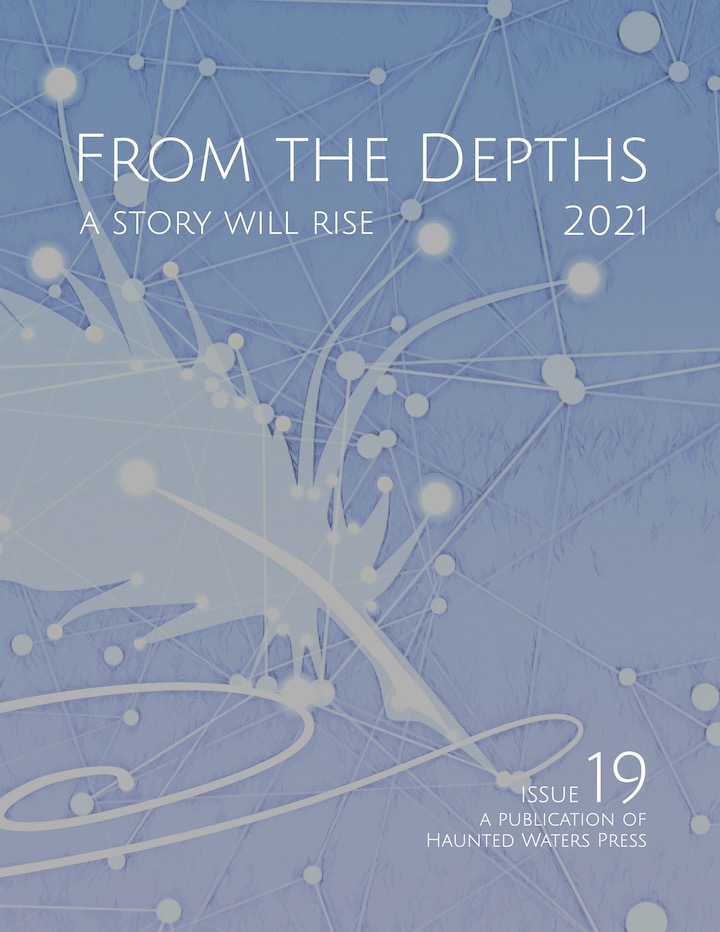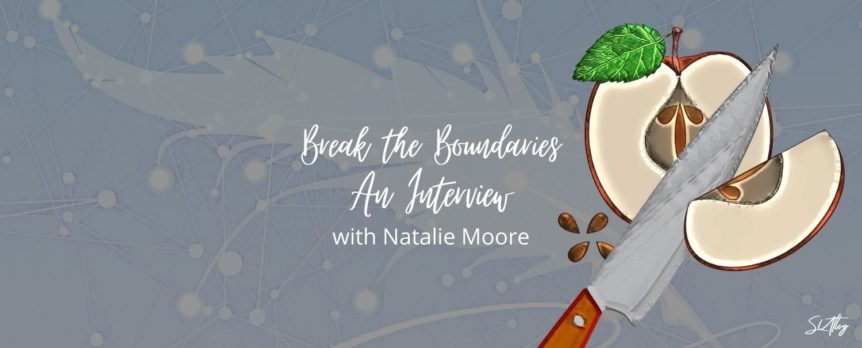Break the Boundaries
An Interview with Natalie Moore
Thank you for joining us for another Haunted Waters Press Featured Author Interview. In this series, we sit down with contributors to chat about their craft and explore the experiences that have shaped their writing.
Today's interview is with HWP Contributor Natalie Moore. Natalie's work of short fiction Abattoir Daydreams is showcased in the 2021 issue of From the Depths. Enjoy!
What joys and challenges do you find in writing short fiction?
The primary challenge for me is keeping short fiction short. I am much more used to writing longer pieces that give me a lot of time to develop characters and worlds. My longer writing tends to also be fantasy, which is difficult to capture in a short format. I used to have a lot more trouble at coming up with "short" ideas, but I think I've been getting better at that since I've been writing short pieces more consistently. Still, my short stories tend to be 5000+ words. I would love to get them down even shorter. I suppose the primary joy I find in writing is the joy of creation. It is a wonderful feeling to mold a little piece of myself and send it out into the world, even if it never gets very far. I also have incredible friends who will read my stuff and give me feedback, so it's nice to have an audience, tiny as it may be. The thing about short stories is it also takes less time to write one, so the satisfaction of being done comes along sooner.
Is there a particular piece of writing or an author you feel has influenced you most as a writer?
Helen Oyeyemi's works, especially The Icarus Girl and White is for Witching, have been super influential to me. Given how incredible her writing is though, it feels almost offensive to draw that comparison. Maybe I aspire to reach a point where I feel confident enough in my work to proudly hail her as an influence. Her stories have this sort of menacing unreality around the edges. There are pieces and phrases of them that have embedded themselves in my subconscious and bob up to the surface every now and then.
I can be a very regimented person, and writing can sometimes feel like an attempt to escape that, to inhabit another mind and body and break the boundaries I set for myself.
Do you have any go-to books about writing or the creative process? What's on your bookshelf?
I don't read much about writing (or the creative process), honestly! When I was a kid, I read books about writing, but I honestly believe that the best way to improve one's writing is to write a lot and read a lot. I certainly don't want to disparage books or methods that work well for others, but when I was younger, reading books about writing felt similar to buying high-end art supplies. It felt like a shortcut I was trying to take to improve. But even the most expensive paints won't apply themselves beautifully to the canvas. As for what's on my bookshelf, it's sadly pretty limited right now! I try not to acquire a ton of possessions out of an ever-present fear of packing and moving from apartment to apartment. I have my Helen Oyeyemi with me and some other essentials, but for the most part, I rely on my Boston Public Library card.
What is your workday like as a writer?
I usually write in the evening from around 8-9. If I’m working on a longer project, I’ll set a daily word goal, usually 500 words. If I’m working on a shorter piece, I’ll just try to work on it daily. If I don’t write regularly like this, I would never finish anything. Some days it’s easier than others. I used to need music to write, but I've gotten better at writing in silence too.
Let’s talk first drafts. Do you compose on a computer, or are you a pen and paper writer?
Definitely a computer. Writing by hand feels like it takes forever, and the words always seem more clumsy. I think my mind tends to rush ahead of my hand, and then it’s frustrating that my hand is so far behind. And anything would look better in a nice standard serif than in my handwriting. I use LibreOffice and would love to make some code contributions to it someday to fix some quality of life issues that bother me regularly. The problem with writing code at work is that I don't want to write code in my free time. Instead, I write fiction! I would love to use Emacs, which is my go-to code editor, for writing fiction, as it has all these great shortcuts and is eminently customizable, but it doesn't have much support for rich text. I guess I could try my hand at writing an Emacs mode for that.
Describe your editing process.
I go back through a draft and do several read-throughs, trying to space them out so I have relatively fresh eyes. Most of this process seems to be trimming the fat; I feel that I often over-explain or include more detail in my first draft than I need or want, so often editing comes down to cutting out words or sentences or, occasionally, whole scenes. Aside from this paring down, my edits usually aren't super extensive. Typically I know the shape of the thing I want to write before I begin writing. If in editing, I find I am unhappy with this shape or its presentation, my solution is not editing but rewriting.
How much of yourself do you allow to flow into your characters?
Probably a lot. Probably more than I intend. Writing is very much an empathy exercise for me. When I'm writing, I tend not to focus on the actual words and sentences and their construction but on the characters about whom I'm writing and what they're thinking and feeling and doing. I can be a very regimented person, and writing can sometimes feel like an attempt to escape that, to inhabit another mind and body and break the boundaries I set for myself. Ideally, the goal would be to successfully imagine myself into the mind of someone unlike me in every conceivable way, but I think that much of my writing tends to go the opposite way where, no matter how different from me I envision a character being, the exercise of trying to be them inevitably leads me to pull them back toward me and imbue them with my own characteristics, deliberately or not.
What words do you live by? Do you have a personal motto?
I like to say my motto is "live fast / die young / bad girls do it well." It's mostly a joke. Mostly.
If you could tell your younger writing self anything, what would it be?
I would thank her for putting in the time and effort and dedication to write as much as she did. My past self wrote a lot of words, a lot of clumsy and miserable words, so that now I can string together words that are hopefully less clumsy and miserable. Couldn't have done it without her!
What comes next for you as a writer?
I'm going to try rewriting one of the old NaNoWriMo novels I wrote almost a decade ago. I really like the idea of it, and I want to try to do it justice. I also recently finished a short story about twin sisters on an ill-fated Himalayan expedition. I want to keep writing short stories but do some longer works as well, and perhaps look into getting some of the other short stories I've written published.

The primary challenge for me is keeping short fiction short. I am much more used to writing longer pieces that give me a lot of time to develop characters and worlds. My longer writing tends to also be fantasy, which is difficult to capture in a short format. I used to have a lot more trouble at coming up with "short" ideas, but I think I've been getting better at that since I've been writing short pieces more consistently. Still, my short stories tend to be 5000+ words. I would love to get them down even shorter. I suppose the primary joy I find in writing is the joy of creation. It is a wonderful feeling to mold a little piece of myself and send it out into the world, even if it never gets very far. I also have incredible friends who will read my stuff and give me feedback, so it's nice to have an audience, tiny as it may be. The thing about short stories is it also takes less time to write one, so the satisfaction of being done comes along sooner.
Is there a particular piece of writing or an author you feel has influenced you most as a writer?
Helen Oyeyemi's works, especially The Icarus Girl and White is for Witching, have been super influential to me. Given how incredible her writing is though, it feels almost offensive to draw that comparison. Maybe I aspire to reach a point where I feel confident enough in my work to proudly hail her as an influence. Her stories have this sort of menacing unreality around the edges. There are pieces and phrases of them that have embedded themselves in my subconscious and bob up to the surface every now and then.
I can be a very regimented person, and writing can sometimes feel like an attempt to escape that, to inhabit another mind and body and break the boundaries I set for myself.
—Natalie Moore
Do you have any go-to books about writing or the creative process? What's on your bookshelf?
I don't read much about writing (or the creative process), honestly! When I was a kid, I read books about writing, but I honestly believe that the best way to improve one's writing is to write a lot and read a lot. I certainly don't want to disparage books or methods that work well for others, but when I was younger, reading books about writing felt similar to buying high-end art supplies. It felt like a shortcut I was trying to take to improve. But even the most expensive paints won't apply themselves beautifully to the canvas. As for what's on my bookshelf, it's sadly pretty limited right now! I try not to acquire a ton of possessions out of an ever-present fear of packing and moving from apartment to apartment. I have my Helen Oyeyemi with me and some other essentials, but for the most part, I rely on my Boston Public Library card.
What is your workday like as a writer?
I usually write in the evening from around 8-9. If I’m working on a longer project, I’ll set a daily word goal, usually 500 words. If I’m working on a shorter piece, I’ll just try to work on it daily. If I don’t write regularly like this, I would never finish anything. Some days it’s easier than others. I used to need music to write, but I've gotten better at writing in silence too.
Let’s talk first drafts. Do you compose on a computer, or are you a pen and paper writer?
Definitely a computer. Writing by hand feels like it takes forever, and the words always seem more clumsy. I think my mind tends to rush ahead of my hand, and then it’s frustrating that my hand is so far behind. And anything would look better in a nice standard serif than in my handwriting. I use LibreOffice and would love to make some code contributions to it someday to fix some quality of life issues that bother me regularly. The problem with writing code at work is that I don't want to write code in my free time. Instead, I write fiction! I would love to use Emacs, which is my go-to code editor, for writing fiction, as it has all these great shortcuts and is eminently customizable, but it doesn't have much support for rich text. I guess I could try my hand at writing an Emacs mode for that.
Describe your editing process.
I go back through a draft and do several read-throughs, trying to space them out so I have relatively fresh eyes. Most of this process seems to be trimming the fat; I feel that I often over-explain or include more detail in my first draft than I need or want, so often editing comes down to cutting out words or sentences or, occasionally, whole scenes. Aside from this paring down, my edits usually aren't super extensive. Typically I know the shape of the thing I want to write before I begin writing. If in editing, I find I am unhappy with this shape or its presentation, my solution is not editing but rewriting.
How much of yourself do you allow to flow into your characters?
Probably a lot. Probably more than I intend. Writing is very much an empathy exercise for me. When I'm writing, I tend not to focus on the actual words and sentences and their construction but on the characters about whom I'm writing and what they're thinking and feeling and doing. I can be a very regimented person, and writing can sometimes feel like an attempt to escape that, to inhabit another mind and body and break the boundaries I set for myself. Ideally, the goal would be to successfully imagine myself into the mind of someone unlike me in every conceivable way, but I think that much of my writing tends to go the opposite way where, no matter how different from me I envision a character being, the exercise of trying to be them inevitably leads me to pull them back toward me and imbue them with my own characteristics, deliberately or not.
What words do you live by? Do you have a personal motto?
I like to say my motto is "live fast / die young / bad girls do it well." It's mostly a joke. Mostly.
If you could tell your younger writing self anything, what would it be?
I would thank her for putting in the time and effort and dedication to write as much as she did. My past self wrote a lot of words, a lot of clumsy and miserable words, so that now I can string together words that are hopefully less clumsy and miserable. Couldn't have done it without her!
What comes next for you as a writer?
I'm going to try rewriting one of the old NaNoWriMo novels I wrote almost a decade ago. I really like the idea of it, and I want to try to do it justice. I also recently finished a short story about twin sisters on an ill-fated Himalayan expedition. I want to keep writing short stories but do some longer works as well, and perhaps look into getting some of the other short stories I've written published.


Lightning Round with

ABOUT THE AUTHOR
Natalie is an ostensibly human software engineer who shares a Boston dwelling with her beloved cat. She enjoys drawing, long walks, and sewing, and has been writing for more than half of her life.
Share this Post

